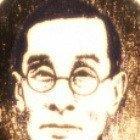The first twenty years of the twentieth century was considered the “golden era” for the development of Protestantism in China. Just having come through the difficult Boxer Rebellion, the Chinese church embraced a large revival with an increase in believers.
The period was also the beginning of the church’s transformation to self-propagation. Chinese pastors gradually replaced western missionaries, becoming the core strength of evangelism. Indigenous pastors began to appear on the stage, including Ding Limei.
Praised as “The Moody of China”, he was born into a Christian family in Daxintuan Village, Jiaozhou, China’s eastern-coastal Shandong Province, on August 2, 1871. His father, Ding Qitang, was one of the earliest Christians in Shandong. In 1884, he enrolled in the Presbyterian Tengchow College. After graduation at the age of 22, he taught there for three years, leading Bible reading classes and often sharing the gospel in the countryside. Ding started to study theology in the college in 1896. Two years later, after graduation, he was ordained as a pastor.
He was seized by the Boxers and almost killed, but fortunately, Yuan Shikai, the governor of Shandong, united with other people to crack down on the movement. Helped by Watson McMillen Hayes, an American Presbyterian missionary and educator, Ding was freed.
After the uprising, he realized that one important factor that resulted in the great tension between church and society was the dependence of the church in China. After that, Ding started to evangelize. Holding revival meetings, retreats, and leading people to Christ, he became one of the forerunners who those Chinese who shared the gospel on their own.
In 1910, the Chinese Student Volunteer Movement was founded in a meeting for north China Christian students held by the Young Men’s Christian Association (YMCA). Ding was appointed as the first itinerant secretary. That year he presided over 87 evangelistic meetings and preached at more than 200 of them. Walking across more than ten provinces, he guided many young intellectuals to Christ and encouraged many people to make donations. In a month, he led more than 1,000 university students to Christ and established branch fellowships in dozens of universities. The fellowships grew to more than 1,600 members, including many who devoted their whole life to evangelism. There were many social elites, such as Zeng Baosun, the granddaughter of Zeng Guofan, who was a Chinese statesman and a Christian educator.
In 1918, Ding launched an evangelist rally with some workers at Lushan Mountain, Jiangxi as he felt deeply for the many people who had yet to hear the gospel in China’s border areas. The second year he led evangelistic bands to preach in remote provinces such as Yunnan, Guizhou, and Xikang. The good news was brought to ethnic minorities. In 1919, he fulfilled his promise that the gospel would be introduced into 18 provinces.
Owing to health reasons, he changed his itinerant ministry into theological education. In 1923, he worked in the North China Theological Seminary as a teacher along with Jia Yumin, a famous Chinese theologian. Nine years later, he became a professor of a Bible college built by the Holiness Mission in Tianjin.
Ding passed away on September 22, 1936, aged 65.
- Translated by Karen Luo












